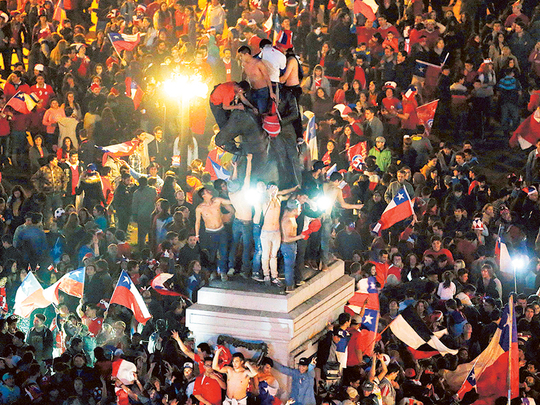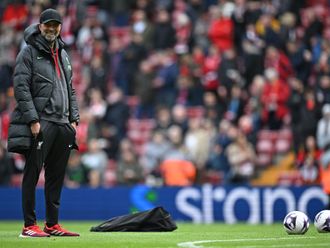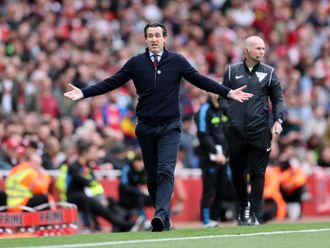
Santiago: A well-organised soccer tournament where the stadiums were largely completed on time and the fans behaved - Chile’s hosting of the Copa America has burnished its credentials as Latin America’s can-do country.
Their players on the pitch also took away the trophy for good measure.
With 12 nations taking part, holding the South American competition is not on the scale of the World Cup, but still provided logistical difficulties in a region where hooliganism has often dogged games.
But there was little of the problems and protests that plagued some host cities for 2014 World Cup in Brazil or Africa’s Nations Cup earlier this year.
Efforts to link up with other competing nations to keep out troublemakers seems to have worked, with no reports of significant violence - at least off the pitch.
The Chilean players were not always so well behaved.
Defender Gonzalo Jara’s bottom poke of Uruguay’s Edinson Cavani earned him a two-match ban and unleashed a wave of Internet memes, while Arturo Vidal pranged his Ferrari after driving drunk.
An anti-discrimination campaign which asked supporters not to jeer opponents’ national anthems was mostly respected, even during the clashes between Chile, Peru and Bolivia, which have been ensnared in acrimonious border disputes.
Chile, one of the region’s most developed countries known for its strong rule of law, also banned many elements used in the past to create a colourful and noisy atmosphere at Latin American matches, such as drums, large banners, fireworks and flares. Alcohol was also forbidden.
Peru’s manager Ricardo Gareca praised Chile’s fans and called the organisation “impeccable” after his team lost Tuesday’s semi-final.
Not all was perfect.
The remodelling of one stadium - in second city Concepcion - slipped in its schedule. Journalists complained of a high level of robberies of cameras and other expensive equipment from supposedly secure areas.
A corruption scandal enveloping world governing body FIFA also threatened to overshadow the tournament, although with officials keeping a low profile or simply not showing up, fans seemed to shrug it off.
The friendly atmosphere did crack a little when Chile played and won the final against neighbours and bitter rivals Argentina on Saturday.
Some booed the Argentine anthem and local media reported that the family of Argentina star Lionel Messi suffered aggression at the hands of Chileans and had to be moved to a safer spot in the stadium.
But there were no serious clashes, as some had feared in the run up to the game.
Former senior official and head of Chilean soccer, Harold Mayne Nicholls, called the organisation “first class” and said there had been no big issues or complaints from teams.
“The image of Chilean football has gone a couple of steps forward and the image of the country - for sure - is on a much better basis than four weeks ago,” he said before the final.
Chile. incidentally, are the fourth team to qualify for the 2017 Confederations Cup in Russia. They join directly qualified hosts Russia, 2014 World Cup winners Germany and 2015 Asian champions Australia.
The eight-team field will be completed by four other regional champions, to be determined at the upcoming Gold Cup for the CONCACAF region of North/Central America and Caribbean, Euro 2016, the 2016 Oceania Nations Cup and the 2017 Africa Cup of Nations.
The Confederations Cup, also is rehearsal for the World Cup the following year, is played in four Russian cities (Moscow, St Petersburg, Kazan and Sochi) between June 17 and July 2, 2017.











